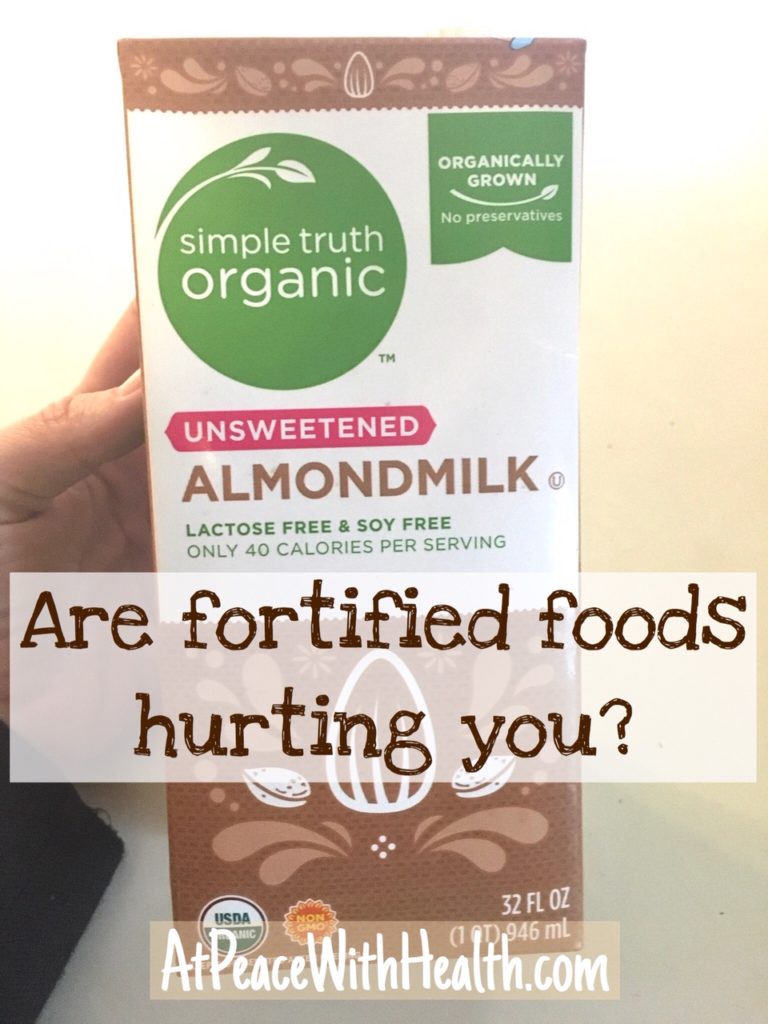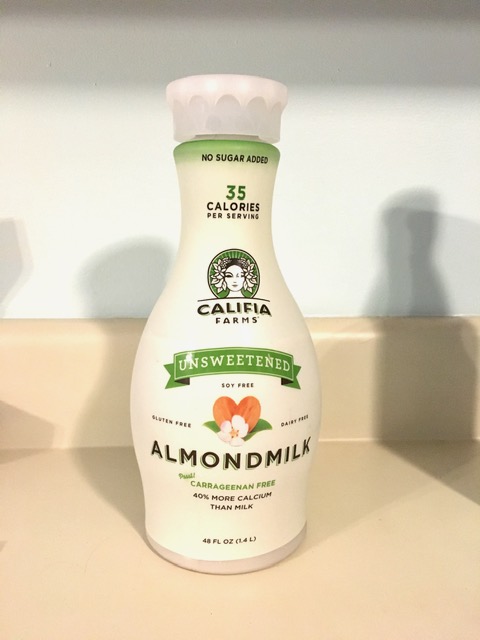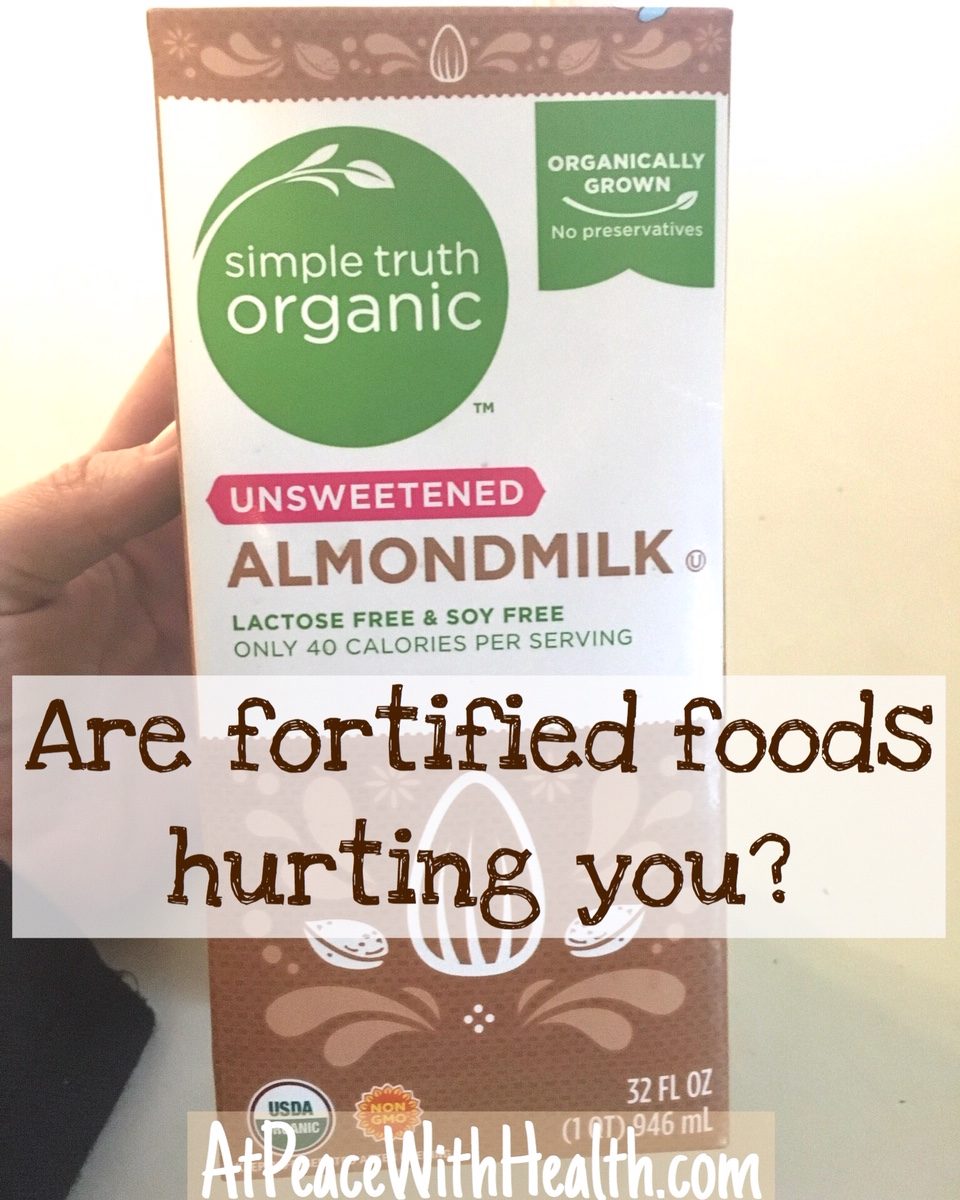You may already be aware that you have MTHFR or perhaps you’ve never heard of it. Considering that in some ethnicities, roughly half the population has a form of MTHFR, I think it’s important that we all pay even more attention to the ingredient labels on our food! [It’s estimated in America that among Caucasians, 10-15% have MTHFR and among Latinos, 25% have MTHFR. These percentages increase depending on ethnicity and location.] As it is a gene mutation, it is handed down. Two of the three of my kids that we have tested have MTHFR mutations. I have one type and my husband has the other, so it’s just a matter of learning which versions the kids received and how we can support them.

Back to the purpose of this blog post: I was feeling pretty good about the organic, unsweetened almond milk I had been purchasing from Kroger for almost two years now. It was organic, which is challenging to find in almond milk, and it didn’t contain any sugar (also hard to find). That met my urgent criteria at the time during my treatment of SIBO . At the time, MTHFR was just a blip on my radar, something I had diagnosed, researched, subscribed to a treatment plan that worked for me, and then somewhat forgot about.
One afternoon, while trying to distract my daughter from her panic attack, showing her tools that I personally use to occupy my brain, I grabbed an empty almond milk container from the recyclable pile and started reading the ingredients outloud to her, showing her where they were and what they meant. I feel fairly confident in the ingredients that we consume, so I stuttered a little as I read to her: “cyanocobalamin, which is vitamin B12”. True, it’s the last ingredient on the list. The nutrition label says it contains 0.6mcg, which isn’t a lot in the grand scheme of things. And I don’t drink much, just a dash in my decaf coffee every day. But, the reality is, I shouldn’t be consuming it. Neither should my children or my husband who all have a variant of MTHFR.

Why shouldn’t we be consuming it? It’s a vitamin, isn’t it? Aren’t vitamins supposed to be good for us? Well, yes, vitamins are good for us, when they are naturally found in food sources. Unfortunately, the vitamins added to our food (“fortified” as the labels brag), are often synthetic (fake) versions of the real thing. Fake might work for some people (the small portion of the population that doesn’t have MTHFR, for instance), but it doesn’t work for those with MTHFR.
I’ve written about MTHFR before, so I won’t go too far into it, but it is a gene mutation. We all have genes and some of them are mutated. To put it simply, MTHFR causes methylation issues, or interrupts the natural breakdown of non-methylated vitamins. Specifically, MTHFR is the inability of the body to convert folic acid into folate. Folate is natural. Folic acid is synthetic. Folic acid is what you’ll see on many vitamin bottles and even fortified food labels, but it’s not in its natural form and if you have MTHFR, your body will not absorb it. Not only that, but because of the consumption of non-methylated vitamins via foods and supplements, the receptor sites for the vitamins get blocked and there are free-floating synthetic vitamin B’s floating around the body wreaking havoc. (I am oversimplifying here in order to paint a picture.)
Consuming non-methylated forms of B vitamins can cause a myriad of symptoms or none at all (in the short term). Be advised that with no ability to breakdown or convert the synthetic vitamin to a usable source, the body will eventually become overburdened by the presence of unusable synthetic vitamins resulting in symptoms eventually. Symptoms vary per person, so I can’t say what you, in particular, will feel. I can tell you that I had a craving for Chex mix a couple of years back, so I bought a few boxes of gluten-free Chex cereal and gluten-free pretzels and peanuts. I made a healthier version of Chex mix and ate some every day, thoroughly enjoying it. I didn’t draw a connection to the heart palpitations I’d started to experience or the increase in anxiety, but I was upset by it and started looking for the source. Very clearly, on the boxes of cereals I’d used, I saw the synthetic vitamins, (so many of them!) and it dawned on me: I was flooding my body with synthetic vitamins that I couldn’t breakdown. A few months later, when I was consuming Luna Bars because they were on sale and delicious, it only took one day of high-vibration anxiety and jitters for me to check the ingredients and realize, yet again, I’d been consuming synthetic B vitamins.
So that’s my experience and not one I want to have again. I have a list in my head of foods that are safe and that is what I purchase. I’m so careful about it, which is why I was shocked that I’d had this synthetic B12 in my almond milk for who knows how long. All I can think is that I was so focused on removing all sugar from my diet while treating my SIBO, that I wasn’t thinking about MTHFR anymore.
I did write to Kroger, because they need to be educated on MTHFR and the danger of using synthetic vitamin fortification of their foods. Of course I received a standard reply thanking me for bringing it to their attention and how much they value their customers’ input. They also said: “Your comments have been shared with our store’s management team for review. We have also shared your concerns to our Quality Assurance Department for review.” I’m not holding my breath.
In addition to anxiety, some MTHFR symptoms include depression, nerve pain, digestive issues, bipolar disorder, schizophrenia, chronic fatigue, migraines, chronic pain, vaccine injuries, miscarriages, tongue ties & lip ties, and the list goes on. If removing synthetic vitamins and foods that contain them, while supplementing with methylated B vitamins can keep those symptoms at bay or reverse them, isn’t it worth considering?
Take away: All vitamins are not created equal.
Here’s what I take and highly recommend: Seeking Health B12 5000 Lozenges. I take a half on an empty stomach first thing every morning. I started with a quarter, and couldn’t handle 3/4. Every body is different. Check out my protocol here.
I read and follow Dr. Ben Lynch of Seeking Health who has done extensive research on MTHFR as well as other gene mutations and he doesn’t recommend constant methylfolate intake, so I’ve taken a break from folate for awhile with no side effects. But when I did take it, this is the brand I used.
Read more about your genes in Dr. Lynch’s book DIRTY GENES!
Want to know if you have MTHFR? I think it’s valuable information but I don’t recommend going to your doctor for it. This one test cost me almost $400 (insurance didn’t cover it). Also, many medical institutions only test for MTHFR C677, not 1298 (which is more likely to cause the horrible symptoms listed above). A 23andme test is $200 and will tell you ALL the gene mutations you have. I can even help you access that information from the test results once you’ve received them.
As they said in the afterschool specials: The more you know! (Please tell me you just said that in your head and saw the star swooshing across the screen!)
This is the milk I’m using now, Califia. It has no sugar, no synthetic vitamins, no carageenan. You can buy it here!




